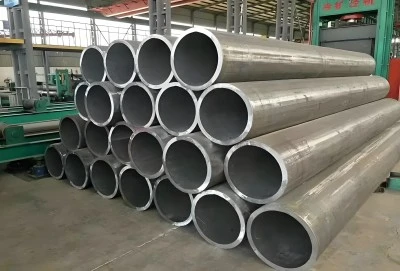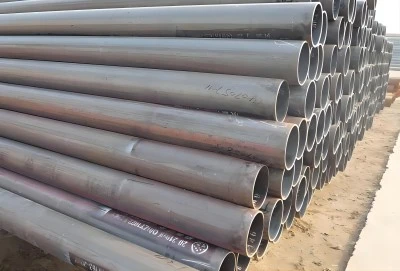The EN 10025-2 standard establishes comprehensive specifications for hot-rolled structural steel products, including S275JR pipes. This standard, developed by the European Committee for Standardization, provides detailed requirements for chemical composition, mechanical properties, and dimensional tolerances. Understanding these requirements is crucial for manufacturers, engineers, and construction professionals to ensure compliance and optimal performance in various applications. This detailed examination explores the key aspects of EN 10025-2 as they relate to S275JR pipes, offering valuable insights into material specifications and quality control parameters.
|
|
|
Chemical Composition:
The chemical composition of S275JR steel pipes plays a fundamental role in determining their mechanical properties and performance characteristics. The carefully regulated carbon content, with maximum values of 0.21% for thicknesses up to 16mm and 0.22% for thicknesses between 16mm and 40mm, ensures optimal balance between strength and weldability. This precise control of carbon content influences the steel's microstructure, affecting both its mechanical properties and fabrication characteristics.
Manganese, limited to a maximum of 1.50%, serves as a crucial alloying element that enhances the steel's strength and hardenability. The interaction between manganese and carbon creates beneficial effects on the material's mechanical properties while maintaining good formability. The controlled manganese content also contributes to improved deoxidation during the steelmaking process, resulting in better overall material quality.
Silicon content restrictions, set at maximum values of 0.035% for thicknesses up to 16mm and 0.040% for greater thicknesses, reflect the element's role in deoxidation and strength enhancement. The careful control of silicon levels helps maintain consistent mechanical properties across different product thicknesses while ensuring good surface quality and coating adhesion properties.
Phosphorus and sulfur content limitations, both set at a maximum of 0.035%, are essential for maintaining steel quality and preventing potential defects. These elements, when present in higher concentrations, can lead to reduced ductility and potential welding issues. The strict control of these residual elements ensures superior mechanical properties and enhanced weldability of the final product.
Nitrogen content restriction to a maximum of 0.012% and copper limitation to 0.40% further demonstrate the comprehensive approach to chemical composition control. These limitations help prevent strain aging effects and ensure consistent material properties across various manufacturing conditions and applications.
Mechanical Properties:
The mechanical properties specified for S275JR steel pipes reflect the material's capability to meet demanding structural applications. The yield strength requirements, establishing minimum values of 275 MPa for thicknesses up to 16mm and 265 MPa for thicknesses between 16mm and 40mm, ensure reliable performance under load-bearing conditions. These requirements consider the relationship between material thickness and strength characteristics, providing appropriate safety margins for various applications.
Tensile strength specifications of 410-560 MPa create a defined range that ensures both adequate strength and sufficient ductility. This balanced requirement allows the material to exhibit predictable behavior under various loading conditions while maintaining necessary safety factors. The specified range also facilitates quality control processes and ensures consistency across different production batches.
Elongation requirements vary according to material thickness, with minimum values ranging from 23% for thicknesses between 3mm and 40mm to 21% for thicknesses between 63mm and 100mm. These graduated requirements acknowledge the influence of material thickness on ductility characteristics while ensuring sufficient deformation capacity across all size ranges. The specified elongation values support both fabrication processes and in-service performance.
Impact testing requirements specify a minimum absorbed energy of 27J at 20°C, demonstrating the material's toughness and resistance to brittle fracture under normal service conditions. This requirement ensures adequate performance in applications where impact loading or sudden stress applications may occur, providing an additional safety factor in structural applications.
Supply Status:
The supply condition of S275JR steel pipes typically involves normalized state delivery, which ensures optimal microstructure and mechanical properties. The normalization process involves heating the material to a specific temperature range, followed by air cooling, resulting in refined grain structure and improved mechanical characteristics. This heat treatment process contributes to consistent material properties and enhanced fabrication capabilities.
Stress-relieving annealing represents an additional heat treatment option available for S275JR pipes. This process helps reduce internal stresses that may develop during manufacturing or fabrication processes. The availability of stress-relief treatment provides flexibility in meeting specific application requirements while maintaining material integrity and dimensional stability.
Dimension And Shape Tolerances:
Dimensional and shape tolerances for S275JR pipes must comply with the UNI EN 10051 standard, ensuring consistency and interchangeability across different manufacturers and applications. These tolerances cover various aspects including diameter, wall thickness, length, and geometric characteristics such as straightness and roundness. The standardized approach to dimensional control facilitates proper fit-up during assembly and ensures reliable performance in service.
The tolerance requirements consider manufacturing capabilities while maintaining necessary precision for structural applications. The standard provides detailed tables and specifications for various dimensional aspects, enabling effective quality control and inspection procedures. These requirements support efficient material handling, fabrication processes, and ultimate application performance.
LONGMA GROUP S275JR Pipe:
LONGMA GROUP manufactures S275JR pipes in accordance with EN 10025-2 requirements, maintaining strict quality control throughout the production process. Their product range encompasses outer diameters from 4 inches to 56 inches, with wall thicknesses varying from 0.237 inches to 5.90 inches. This comprehensive size range accommodates diverse application requirements while maintaining consistent quality standards across all dimensions.
Quality assurance measures implemented by LONGMA GROUP include regular material testing and dimensional verification to ensure compliance with EN 10025-2 specifications. Their production facilities maintain capabilities for both standard and custom size requirements, supported by inventory levels of 100-200 tons. The company's commitment to delivery efficiency is demonstrated through its ability to fulfill orders within 7 days, depending on specific requirements and quantities.
Professional support and technical consultation services are available through LONGMA GROUP's dedicated communication channel at info@longma-group.com. Their expertise in S275JR pipe manufacturing and thorough understanding of EN 10025-2 requirements enable them to provide valuable guidance for material selection and application considerations.














